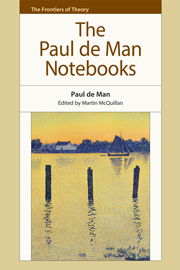Book contents
- Frontmatter
- Contents
- Series Editor's Preface
- Acknowledgements
- Dedication
- Introduction: ‘The Unimaginable Touch of Time’: The Public and Private in the Notebooks of Paul de Man
- PART I Texts
- PART II Translations
- PART III Teaching
- PART IV Research
- 27 The Unimaginable Touch of Time: Proposed Table of Contents
- 28 Modernism in Literature: Background and Essay Selection
- 29 Modernism in Literature: Revised Table of Contents
- 30 The Portable Rousseau: Table of Contents
- 31 The Portable Rousseau: Principle of Selection
- 32 Outline for a Monograph on Nietzsche
- 33 From Nietzsche to Rousseau
- 34 Allegories of Reading: Figural Language in Rousseau, Nietzsche, Rilke, and Proust
- 35 Aesthetics, Rhetoric, Ideology
- 36 11/3/82
- Appendix. The Notebooks of Paul de Man 1963–83
- Bibliography
- Index of Names
28 - Modernism in Literature: Background and Essay Selection
from PART IV - Research
Published online by Cambridge University Press: 05 December 2014
- Frontmatter
- Contents
- Series Editor's Preface
- Acknowledgements
- Dedication
- Introduction: ‘The Unimaginable Touch of Time’: The Public and Private in the Notebooks of Paul de Man
- PART I Texts
- PART II Translations
- PART III Teaching
- PART IV Research
- 27 The Unimaginable Touch of Time: Proposed Table of Contents
- 28 Modernism in Literature: Background and Essay Selection
- 29 Modernism in Literature: Revised Table of Contents
- 30 The Portable Rousseau: Table of Contents
- 31 The Portable Rousseau: Principle of Selection
- 32 Outline for a Monograph on Nietzsche
- 33 From Nietzsche to Rousseau
- 34 Allegories of Reading: Figural Language in Rousseau, Nietzsche, Rilke, and Proust
- 35 Aesthetics, Rhetoric, Ideology
- 36 11/3/82
- Appendix. The Notebooks of Paul de Man 1963–83
- Bibliography
- Index of Names
Summary
This anthology is conceived as background reading for courses in nineteenthand twentieth-century general literature, fiction, poetry or literary criticism, as taught in Departments of English, Comparative Literature or under the auspices of General Education (Humanities) programs. Since the principle of selection that has determined the choice of texts is not obvious, some clarification of the book's general purpose may be needed.
The understanding of contemporary literature is considerably enriched if it is seen as part of a general movement of ideas, or of an extended reflection on the nature of literature, that originates in the past. Students respond to the writings of Kafka, Joyce, Rilke or Sartre by feeling an affinity of a type that they could not experience towards, say, Pope or Racine, since it is an affinity grounded in a shared modernity. If this intuitive response can be made more explicit by a deeper understanding of the time-bound literary temper to which students react, an important educational function is performed. This increased understanding can be gained in several ways, e.g. historically, by giving insight into the development that has led to the present-day conception of what literature ought to be. Readers approach literature with certain expectations that vary from generation to generation; to achieve a properly critical reading, we must become aware of the successive stages that have shared the particular set of expectations that we recognize to be modern.
- Type
- Chapter
- Information
- The Paul de Man Notebooks , pp. 286 - 292Publisher: Edinburgh University PressPrint publication year: 2014

